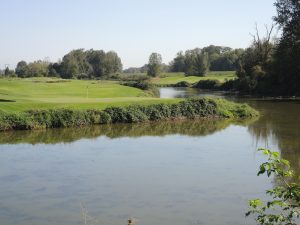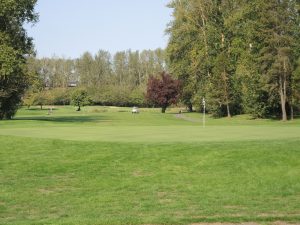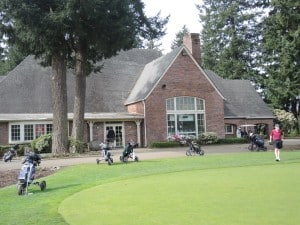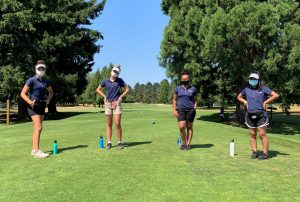In November 2022, a significant event quietly occurred in Oregon’s golfing world. The event effects the second most played complex of courses in the State. Effective November 1, 2022, KemperSports Management, LLC (“Kemper”), became the operations manager for five of Portland’s municipal golf courses (that’s all courses except RedTail). Other than the Bandon complex of courses, the collective operations of those five Portland municipal courses make up the largest golf course operation in Oregon.

The contract between the City of Portland (the “City”) and Kemper (the “Contract”) provides for an initial term of five years with the City having the right to renew for five additional years. Kemper is paid by the City $32,000 a month (or $384,000 annually) plus an incentive fee of 15 percent of any net operating income over $5,800,000 a year (Kemper estimates this amount will be about $244,000 over the first five years). Both amounts are subject to annual adjustments. The City also pays Kemper certain fees and pays all operating expenses. In return, Kemper manages all non-maintenance operations at the courses, including food and beverage, lessons, and merchandizing. Kemper is to develop and implement a reservation platform and marketing plan, and “a consistent brand for the courses consolidated for better recognition.” Kemper is to also provide $200,000 for “start-up costs or priority facility improvements.”
So how did this happen, and will it be good for golf in Portland?
Background
The City of Portland is fortunate to have five quality 18-hole municipal golf courses: Eastmoreland (a Chandler Egan design, seventh oldest course in Oregon and two-time host of the USGA Amateur Public Links Championship), Rose City (clubhouse is on the National Register of Historic Places), Heron Lakes (both Blue and Greenback courses, home of the former NW Open and the 2000 USGA Amateur Public Links Championship), and RedTail. The City also has Colwood, a golf practice complex that includes a 3-par course.
Although historically profitable, before COVID, rounds played at the courses had been dropping (46% decrease between 1994 and 2019), and expenses increased faster than green fees. The Golf Fund, which is an operating reserve funded by green fees and concessioners’ payments, went from a balance of $1.5M in 2013 to $300K in 2017. In 2018, the City provided an emergency advance of $800,000 to support the courses.
In 2019, the management of the City’s municipal golf courses was a hodge-podge of entities and types of contracts: Kemper operated Herron Lakes (since the early 2000s) and Colwood (since the late 2010s) under management contracts (essentially a set fee for management, where the City pays all operating expenses and receives all income); Hank Childs Golf Shop, Inc., operated Rose City (since the mid-1990s) under a concession agreement (with the City receiving a portion of net revenue but not incurring non-maintenance expenses); Cumpston Brothers, Inc, operated Eastmoreland (since the mid-1970s) also under a concession agreement; and RedTail Golf, LLC, operated RedTail under a lease agreement.

In May 2019, the Portland City Auditor issued a report projecting further decreases in play and revenue, stating a concern over the differing types of operation and management contracts among the courses and about the lack of oversight and enforcement of those contracts. Portland Parks and Recreation (“PP&R”), the bureau under which the courses are managed and operated, also issued a report stating that there was a $43 million backlog in maintenance and the courses had an annual maintenance cost of $1.9 million. In response to the City Auditor’s report, the operating contract at Heron was extended to October 2022, so that the operating contracts at Heron, Eastmoreland, Rose City, and Colwood (collectively, the “Courses”) would all expire at the same time. [The agreement at RedTail does not expire until 2042 and was never part of the courses being considered for a new management contract.]
In early 2021, the City engaged GGA Partners to review the operations at all the courses and make recommendations as to what would be best for the City and its golfing public going forward. GGA Partners issued its report in October 2021. Among its findings:
- The status quo was not financially sustainable
- Significant improvements of financial performance were possible
- Operations must focus on driving high-margin golf related revenues
- All facilities should be grouped to a single master agreement with a single operator
- All aspects of the visitor experience had to be improved
In the report, GGA recommended, among other things: - Consolidate all courses under a single contract to promote consistency and provide economies of scale
- Provide dynamic pricing
- Centralize booking
- Provide for system-wide marketing
- Develop a standard approach to capital allocations
In March of 2022, after a review of the GGA report, Portland City Council authorized a competitive bidding process to manage and operate the Courses “in the most financially sustainable manner.” Proposals were to have terms to “promote greater diversity with staff and customers and enhance access to the game.” Bids could be for one or all of the Courses. [It should be noted that the Childs and Cumpston folks have well-deserved and deeply devoted followings. In some quarters it may have been considered sacrilegious to even consider not renewing their contracts.]
The City’s RFP went out in the early summer of 2022, calling for the management model (the manager/operator would be paid a fee but the City would pay all expenses and receive all revenues). The City received bids from Kemper, Troon Golf, CourseCo., Regency Golf Club Management, Touchstone Golf, and a new local entity Golf PDX, LLC. All bids were to manage all facilities. Bids and bidders were then reviewed for, among other things, corporate responsibility, experience, vision, financial impact, and proposed fees. After review by an evaluation committee, the Chief Procurement Officer recommended that Kemper be awarded the bid.
[I am not second guessing if Kemper should have been awarded the concession. Some bids had lower management fees, and certain bidders had a deeper relationship with the Courses, but those were not the only factors being weighed and I was not in the room. It is possible that the long-term relationship the City had with Kemper provided the City had a better idea of what Kemper was capable of (and Kemper had a better idea of what the City wanted), and it was probably easier for Kemper to expand its existing operations to two additional courses. The City followed its required bidding process, and the evaluation summaries are available to the public.]
On October 26, 2022, the City Council approved the award to Kemper by a 3 to 2 vote. Commissioners Hardesty and Ryan objected to the motion to approve the contract on the grounds that they did not understand why the City was not retaining its existing operating structures (Commissioner Hardesty also raised concern about agreeing to such a large contract pertaining to a lot of open space when issues around houselessness had not been resolved).
How the Contract Works
Under the Contract, in January of each year, Kemper is required to provide the City with a business plan for operations at the Courses for the next fiscal year (July through June). The business plan is to include an operating budget, capital expenditure budget (which includes how Kemper plans to use its $200,000 contribution), operating plan, marketing plan, and diversity and inclusion plan. If the City approves the business plan, it will begin advancing to Kemper the expenses set forth in the approved budget on a monthly basis (there are provisions for adjustments to the amount of expenditures during the fiscal year). [Note: green fees have to be set in accordance with guidelines set by the City.]
Also under the Contract, Kemper is to coordinate and promote First Tee programs and coordinate and support youth golf programs and other partner organizations identified by the City. If required by the City’s Director of Golf, Kemper is to continue the EAGLE Caddie program.
What’s Next?
I was fortunate to communicate with the parties to, and some of the folks effected by, the Contract to see what they thought and if there was agreement about what should happen going forward.
Randy Morrison, Regional General Manager KemperSports, stated that Kemper presently plans on retaining its current Portland management team (even though it is taking on two additional courses), except that Kemper may hire someone to assist in marketing/promoting golf to historically underrepresented communities as well as formulating internal initiatives to support diversity, equity, and inclusion in staffing. Kemper also plans on retaining existing employees at Rose City and Eastmoreland, including Henry Childs, to provide continuity and perspective. Mr. Morrison also stated that Kemper will reach out to work with local organizations that promote golf, such as First Tee and Leisure Hour, to see how existing programing could be improved when all the Courses are involved. [And I have already seen surveys sent out by Kemper to the folks who have played at Eastmoreland and Rose City (which is great).]

Mr. Morrison stated that Kemper’s initial priorities are to unify the systems among the Courses, particularly point of sale and reservation systems, and to develop systems and benchmarks to be able to better measure outcomes at the Courses. Also on the priority list is improving ascetics at each of the clubhouses, particularly in the food and beverage areas (this is what the $200,000 contribution from Kemper will probably be used for).
I asked Mr. Morrison what he was excited about in adding two courses to Kemper’s Portland operations. He responded, “Unifying all the facilities from both the customer and staff perspective. Getting the staff more involved and finding out more from the customers, and seeing new ideas brought in.”
On what Kemper would like to accomplish within the next five years, he said “Financial stability [for the Courses], improved outreach, improved awareness of what the facilities have to offer, developing benchmarks, and having the ability to determine how things have improved from those benchmarks.”
Vincent Johnson, Director of Golf for Portland Parks & Recreation, stated that he expects Kemper to partner with organizations that work to expand and/or diversify golf in programming and the development of new opportunities. Director Johnson believes that by managing all the Courses, Kemper will create greater operational efficiencies and make implementation of system-wide strategies possible. Over the next five years, he wants to see: the lowering of barriers to golf to increase diversity in golfers and among golf staff; an expansion of inclusive programming; and improvement of customer experience, both online and at the courses. Director Johnson concluded, “These efforts will better connect our public with the great offerings at our golf courses and reinforce our facilities as inclusive, welcoming places that play a meaningful role in the lives of our vibrant communities. Successes in those key areas will also convert into greater revenues for the Golf Program, growing the fund balance for deferred maintenance and future projects.”
Alex Chitsazan, chair of Portland’s Golf Advisory Committee (“GAC”), said that he is looking forward to having the Courses under a single operator and system and believes that should improve operations and reduce expenses. He is also excited in seeing how Kemper can grow and diversify the game, noting the success that Kemper had at Colwood. And he is happy that Kemper is trying to maintain the community feel of the courses, initially through the retention of employees.
In speaking with representatives of the men’s clubs (I did reach out to women’s clubs, but no one responded), they are hoping that Kemper and the City provide a better experience for the golf visitor, both in terms of course conditions (which the City will continue to control) but also in the entire experience before the first tee, from reservations to parking, practice facilities, and being in the clubhouse.
Will the Agreement be good for Golf in Portland?
The short answer is maybe (which is better than hopefully).

On the surface, Kemper and the Contract provide a good foundation for success. Kemper is a nationally recognized expert in golf management (including management of municipal golf courses) and has extensive resources and experience. Kemper has an existing team in Portland that has been working with the City for a long time. And Kemper has had some success in Portland: for example, in 2022, Kemper, as the operator at Colwood, received the Player Development Award given by the National Golf Course Owners Association in recognition of a course’s player development programs. The GAC is also happy with how Kemper has been running Heron and Colwood, particularly how Kemper has maintained the sense of a golf community. [Note that the Chair of Heron Lakes Men’s Club did object to the concession being awarded to Kemper on the basis that Kemper had not materially improved operations at Heron.]
By having the power of approval over Kemper’s proposed business plans, the City is able to coordinate with Kemper on maintenance and capital improvements at the Courses. The City should also be able to maintain its priorities, in particular improving diversity and access (along with profitability), while Kemper seeks to improve profitability (along with diversity and access). The Contract’s specific reference to maintaining relationships with organizations that are looking to diversify and expand who uses the courses is also reassuring.
Finally, the comments that I received from Kemper, the City, GAC, and the men’s clubs support the conclusion that there is a significant amount of agreement as to what should happen next, and what the goals over the next five years should be (although there may be a difference in priorities).
While this is all good, I have some concerns. In speaking with groups that support broadening access to golf and the men’s clubs for Eastmoreland and Rose City, they were not consulted as part of the selection process. The GAC was kept up to date on the selection process, but the committee was not included as part of the evaluation of RFP responses (although some individuals were on the evaluation committee). (These groups did contribute to GGA’s investigation and the GAC did provide comments to the City as part of the review of the GGA report.)
I am concerned that going forward the groups that support expanding and diversifying golf may not have opportunities to significantly contribute to Kemper’s proposed operations (other than what Kemper may do in reaching out to these groups). In particular, it does not appear that the GAC will be given the opportunity to review and comment on Kemper’s annual proposed business plan (which appears to be within the GAC’s duties under City Code 3.86.030), and that the reviews will only be done within the City (although GAC, through subcommittees, does provide the City and Kemper monthly input on operations). I would think that including in the review process (or at least getting annual comments from) folks and organizations that frequently use the Courses and are working to achieve the City’s objectives would be a good thing.

PP&R has a first-rate team supporting its golf courses. Kemper has and can be a valuable addition to successful management of those courses. The Contract requires communication and a balance between the City and Kemper. All of this points towards probable future success. Although the Contract requires coordination and support between Kemper and those organizations promoting youth programs and programs identified by the City (presumably to increase diversity of golfers), the extent of such coordination and support is not spelled out and has yet to be seen. Supporting and frequently listening to those organizations that share the objectives of the City (expanding the game, diversifying the game, and financial stability) and who actually play the Courses, would be important in the annual planning process.
Portland’s municipal courses are a great asset to its citizens. Right now, Portland needs as many positive assets as possible. I am hoping that five years from now, the City will be able to point to the Courses and its management as an example of what makes Portland great.
Submit your review | |



